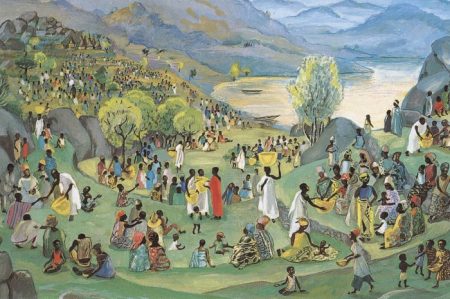Matthew 14:13-21
Taking the five loaves and the two fish, he looked up to heaven, blessed and broke the loaves, and gave them to the disciples, and the disciples gave them to the crowds. – Matt. 14:19
Doing an examen, which is a looking back in prayer at the events of my day or week or even my entire life, I love remembering all the gifts I have either given or received. Big ones or little ones – the concrete and practical ones like the computer I am writing on or the spiritual ones like teaching a class on prayer – they all bring me profound joy. Each represents a way in which I have been touched by love, touched by the living God who is love.
Looking at today’s Gospel reading we are tempted to think, “Poor Jesus.” He had gone away to a deserted place to mourn the death of his friend, John, the Baptist, and had found that thousands of needy people had come out there looking for him. Having compassion on them, he had spent the day healing their sick and suffering. We could imagine him overwhelmed and struggling, alone amid incompetent disciples and the clueless crowd, drained and exhausted.
But Matthew does not portray him like that. This is Jesus the Messiah. He is the source of all healing and all nourishment. He is never-tiring abundance. He could produce food for the people out of stones if he so desired. He could create it from nothing. He is never depleted. The people with him don’t have to go away to towns to find bread; Christ is their bread.
Why, then, does he use the five loaves and two fish that the disciples give him instead of conjuring bread from nothing? And why does he hand the broken bread to his disciples to distribute instead of having it magically appear in the laps of every family sitting on the grass around him? “You give them something to eat,” he tells his followers.
All of us, his disciples in the world today, are to feed people – literally and figuratively. We each have our part. There are gifts we must give and others we must receive. We are not meant to focus on our incompetence or inadequacy, our human frailty in the face of the world’s need. We are not supposed to be distracted by riches or power. We are the instruments of God’s nurture. And here’s how to be of service to the living God and his Messiah: go to the Source, receive what we are handed, and start giving it out to those around us.
In prayer and discernment we receive Christ’s chunk of bread. It could be food or medicine, mosquito tents or warm blankets, information or know-how. It could be guidance, wisdom or good listening. It could be healing music or art that invites the soul into relationship with God. It is all the gifts. We take it into our hands and we give it to those around us. And then we go back for more.
The Source is never-failing. We can approach again and again. In different seasons of our lives the bread will take different forms. In our weakness, for instance, our giving becomes its own receiving. And all of this belongs to God, to the mysterious joyful abundance of God’s love.

